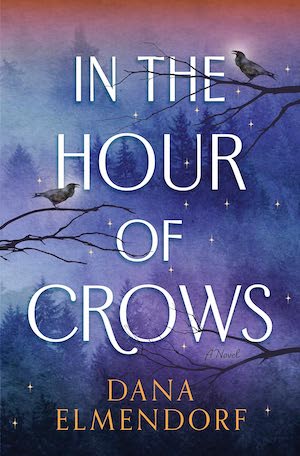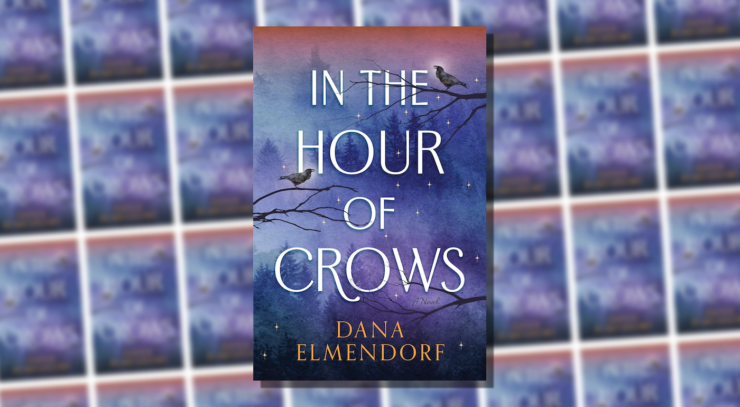In the small town of Black Fern in Appalachian Georgia, Weatherly Wilder can save you from death. But just once.
It’s not a neat, orderly type of magic. It’s wrapped up in souls and the particular sounds they make. When one is close to dying, Weatherly can seek out its faint and fading music, the curl of death that surrounds it. With the right secret, whispered words—passed down from her grandfather and plucked from the Bible—she can lure death from the sickly, weakened soul into hers, then trap it. Her patient is free to live another day, while Weatherly faces the unenviable task of fighting off death herself now that she’s deprived it of a meal.
That pain, the days of shuddering sickness that follow a successful use, is one hint that her power isn’t so much a gift as a curse. Her grandmother, the bitter and crotchety Agnes Wilder, uses the byproducts of Death Talking to make her charms and hexes for those she thinks deserve it: rashes for cheaters, misfortune for thieves, insomnia for liars. Sometimes, when her supplies run low, she takes Weatherly to a nursing home and nudges a few of its residents closer to death so Weatherly can save them. It obligates her even to those who hate her—or whom she hates—because few are too proud to beg when death comes knocking, even if they curse and resent her with every other word.
And if she’s too late, or working a dead-end shift at the diner, or passed-out drunk, Weatherly can’t save anyone—just like she couldn’t save her cousin Adaire, hit by a car while biking, her soul gone into the wilderness without Weatherly to hold it in place.
Buy the Book


In The Hour of Crows
Adaire’s death hangs over the story, a mystery that nobody but Weatherly thinks needs solving. Adaire’s death has been ruled an accident, legally speaking; the story opens on the court trial of Mayor Rutledge, let off with a stern warning by a friendly judge. But Adaire had her own power: She was a scryer, able to see the future in reflective surfaces. When scrying for Weatherly in a cast-iron pan (one of my favorite details, by the way; the way magic is accomplished in ordinary vessels like cooking implements or scattered mugs), her visions went dark and foggy. She dug around in her visions for days before her death, leaving only cryptic messages, and so Weatherly is convinced she was murdered, that her visions all meant something…and that she can make up for her failure by figuring out what.
I’ve already mentioned my love for the low-cost magic workarounds. Throughout the novel, what makes it unique is that there’s no grandeur to it. Weatherly and her small crew of friends are barely getting by. There’s the brash Raelean, skeptical of magic but always willing to help Weatherly in her schemes even when it risks arrest, and the more quiet and studious Davis, who was Adaire’s boyfriend and who’s trying to finish his EMT training to get out of Black Fern. So much of fantasy—even modern, urban fantasy—is realized on a world-shaking scale, and so it’s nice to have one with few ripples beyond the borders of the town.
And more than that, the magic of In The Hour of Crows is dominated by failure. There’s Weatherly’s failure to save Adaire because she simply can’t be there in time; then, as she’s still grieving and angry, she has to try and talk the death out of Ellis Rutledge, the mayor’s son. And she fails. There’s a friction between their two souls, a spark that shocks her away before she can lure death from him, and so he dies. Everyone around her thinks it was spite or malice that meant she wouldn’t save him, but Weatherly knows she simply couldn’t.
It sets the tone of the novel, giving it a swirling sadness that makes us desperate to see Weatherly succeed. Everyone asks too much of her: Her grandmother, and the rich and powerful of the town, seem to expect her to save them all, to push her body to the limits while getting nothing in return—and all the while she’s haunted by her failures, oftentimes literally. Adaire’s ghost flits in and out of the story. There’s also a boy, Rook, who spends most of his time as a flock of crows, a strange leftover soul from Weatherly’s one and only attempt to talk the death out of the dead, rather than just the merely dying. Weatherly doesn’t ask for much, the book tells us—but she deserves better, and readers are meant to recognize that even when the people around her can’t.
In The Hour of Crows is a deeply enchanting story, because it wraps its magic so well in realism and emotion. Even writing this review, I couldn’t say exactly how it works—nor do I need to. I know how it feels to talk the death out of someone, and I know how it feels to be ostracized and desired at the same time for such an “unnatural” way of saving lives. The mystery of what happened to Adaire and the storm of Weatherly’s own emotions dovetail wonderfully together, and I’d highly recommend the book to anyone interested in either element!
In The Hour of Crows is published by MIRA.










